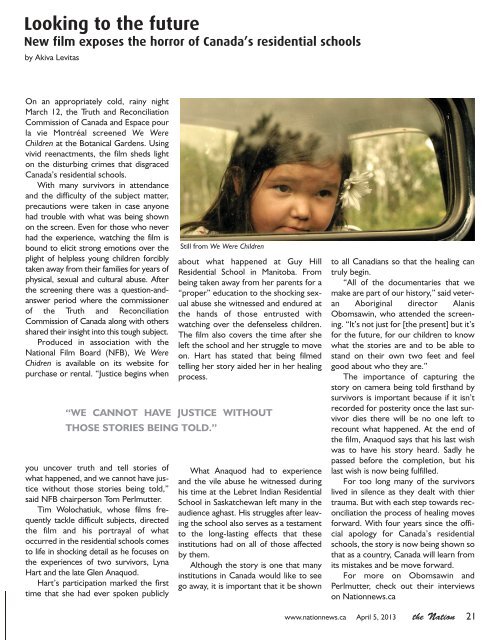Nation-20-11
Nation-20-11
Nation-20-11
You also want an ePaper? Increase the reach of your titles
YUMPU automatically turns print PDFs into web optimized ePapers that Google loves.
Looking to the future<br />
New film exposes the horror of Canada’s residential schools<br />
by Akiva Levitas<br />
On an appropriately cold, rainy night<br />
March 12, the Truth and Reconciliation<br />
Commission of Canada and Espace pour<br />
la vie Montréal screened We Were<br />
Children at the Botanical Gardens. Using<br />
vivid reenactments, the film sheds light<br />
on the disturbing crimes that disgraced<br />
Canada’s residential schools.<br />
With many survivors in attendance<br />
and the difficulty of the subject matter,<br />
precautions were taken in case anyone<br />
had trouble with what was being shown<br />
on the screen. Even for those who never<br />
had the experience, watching the film is<br />
bound to elicit strong emotions over the<br />
plight of helpless young children forcibly<br />
taken away from their families for years of<br />
physical, sexual and cultural abuse. After<br />
the screening there was a question-andanswer<br />
period where the commissioner<br />
of the Truth and Reconciliation<br />
Commission of Canada along with others<br />
shared their insight into this tough subject.<br />
Produced in association with the<br />
<strong>Nation</strong>al Film Board (NFB), We Were<br />
Chidren is available on its website for<br />
purchase or rental. “Justice begins when<br />
you uncover truth and tell stories of<br />
what happened, and we cannot have justice<br />
without those stories being told,”<br />
said NFB chairperson Tom Perlmutter.<br />
Tim Wolochatiuk, whose films frequently<br />
tackle difficult subjects, directed<br />
the film and his portrayal of what<br />
occurred in the residential schools comes<br />
to life in shocking detail as he focuses on<br />
the experiences of two survivors, Lyna<br />
Hart and the late Glen Anaquod.<br />
Hart’s participation marked the first<br />
time that she had ever spoken publicly<br />
Still from We Were Children<br />
about what happened at Guy Hill<br />
Residential School in Manitoba. From<br />
being taken away from her parents for a<br />
“proper” education to the shocking sexual<br />
abuse she witnessed and endured at<br />
the hands of those entrusted with<br />
watching over the defenseless children.<br />
The film also covers the time after she<br />
left the school and her struggle to move<br />
on. Hart has stated that being filmed<br />
telling her story aided her in her healing<br />
process.<br />
“WE CANNOT HAVE JUSTICE WITHOUT<br />
THOSE STORIES BEING TOLD.”<br />
What Anaquod had to experience<br />
and the vile abuse he witnessed during<br />
his time at the Lebret Indian Residential<br />
School in Saskatchewan left many in the<br />
audience aghast. His struggles after leaving<br />
the school also serves as a testament<br />
to the long-lasting effects that these<br />
institutions had on all of those affected<br />
by them.<br />
Although the story is one that many<br />
institutions in Canada would like to see<br />
go away, it is important that it be shown<br />
to all Canadians so that the healing can<br />
truly begin.<br />
“All of the documentaries that we<br />
make are part of our history,” said veteran<br />
Aboriginal director Alanis<br />
Obomsawin, who attended the screening.<br />
“It’s not just for [the present] but it’s<br />
for the future, for our children to know<br />
what the stories are and to be able to<br />
stand on their own two feet and feel<br />
good about who they are.”<br />
The importance of capturing the<br />
story on camera being told firsthand by<br />
survivors is important because if it isn’t<br />
recorded for posterity once the last survivor<br />
dies there will be no one left to<br />
recount what happened. At the end of<br />
the film, Anaquod says that his last wish<br />
was to have his story heard. Sadly he<br />
passed before the completion, but his<br />
last wish is now being fulfilled.<br />
For too long many of the survivors<br />
lived in silence as they dealt with thier<br />
trauma. But with each step towards reconciliation<br />
the process of healing moves<br />
forward. With four years since the official<br />
apology for Canada’s residential<br />
schools, the story is now being shown so<br />
that as a country, Canada will learn from<br />
its mistakes and be move forward.<br />
For more on Obomsawin and<br />
Perlmutter, check out their interviews<br />
on <strong>Nation</strong>news.ca<br />
www.nationnews.ca April 5, <strong>20</strong>13 the <strong>Nation</strong> 21


